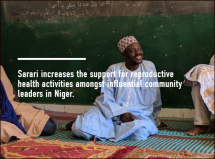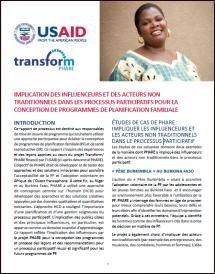Innovation Brief: Insights from Model Providers in Cote d’Ivoire to Strengthen Voluntary Family Planning Service Delivery
“Model providers” are health workers who deliver high quality services, such as voluntary family planning (FP), despite societal and systemic obstacles. Such high-performing service providers can be identified through supervisor evaluation and confirmed through an assessment of client experience (e.g., mystery client surveys).
The insights and examples of model providers can be used to support and improve provider performance across the workforce, ultimately increasing access to voluntary FP. The aim of this brief is to describe the characteristics of model providers and how they respond to the barriers they face, as identified in the Transform/PHARE Côte d’Ivoire study.
The brief includes recommendations to foster high performance across the FP workforce.
Source: Population Services International
Date of Publication: March 1, 2021
SIMILIAR RESOURCES
Tools
Examples
- Innovation Brief: Engaging Influencers and Non-Traditional Actors in Participatory Processes for Family Planning Program Design
- Innovation Brief: Breaking Down Barriers to Family Planning Access by Engaging Agents of Change
- Innovation Brief: Translating Audience Segmentation Data into Family Planning Programmatic Action
- Innovation Brief: Identifying Power Dynamics Among Target Audiences and Influencers in the Project Design Process
- Birth Spacing and Family Welfare Sermons
- Advocating for Social and Behavior Change in Family Planning Programs: A Message Framework
- A Blueprint for Applying Behavioral Insights to Malaria Service Delivery: Methods and Frameworks for Improving Provider Behavior
- Plan Stratégique National de Plaidoyer en matière de lutte contre le Paludisme (PSNPP) en Côte d'Ivoire 2018-2023
- Guide de Formation Conseil Dépistage du VIH au niveau Communautaire: manuel à l'intention du personnel non médical
- Lever les Tabous: La sexualité et les approches promouvant l’égalité des genres pour mettre fin aux unions et aux mariages d’enfants, précoces et forcés
- Innovation Brief: Leveraging Technology to Develop and Test Family Planning Mass Media Campaigns in Niger and Cote D’Ivoire
- Innovation Brief: Model Provider Research Approach to Identify Barriers and Facilitators to High Quality Family Planning Services
- Innovation Brief: The Importance of Segmentation and Tailoring Messages to Constructively Engage Men and Boys in Voluntary Family Planning
- Innovation Brief: A Total Market Approach for Voluntary Family Planning Programming that Includes Social and Behavior Change Communication
- Innovation Brief: Applying the Human-Centered Design Approach



